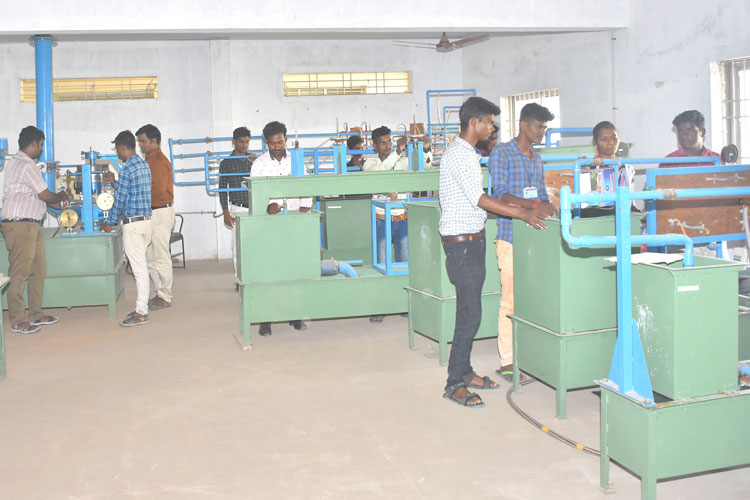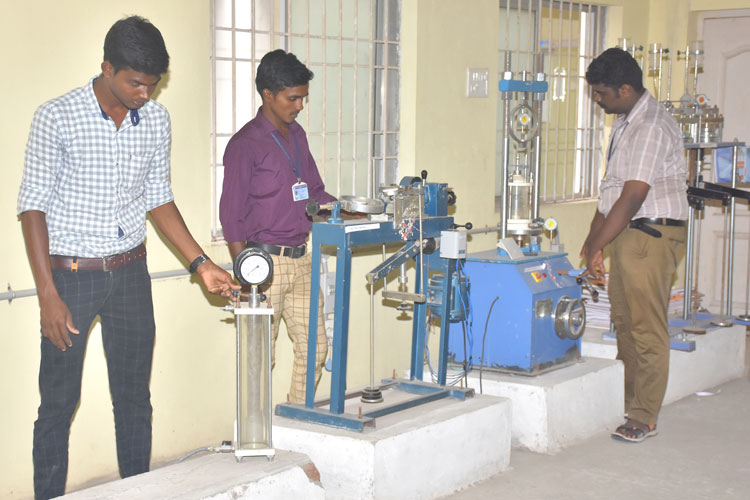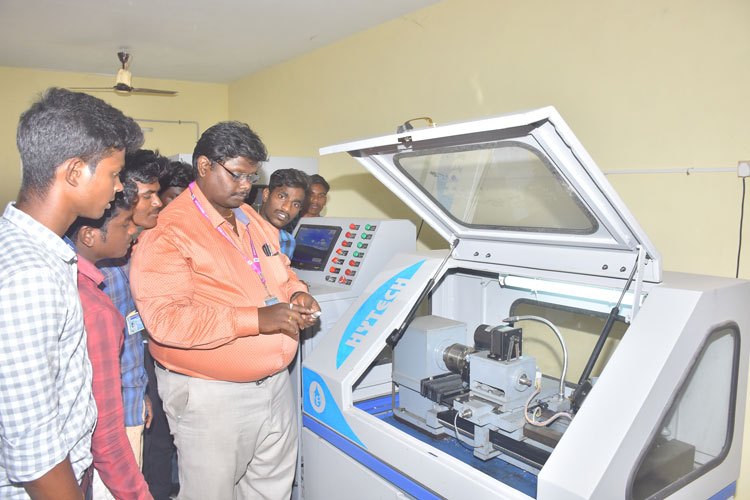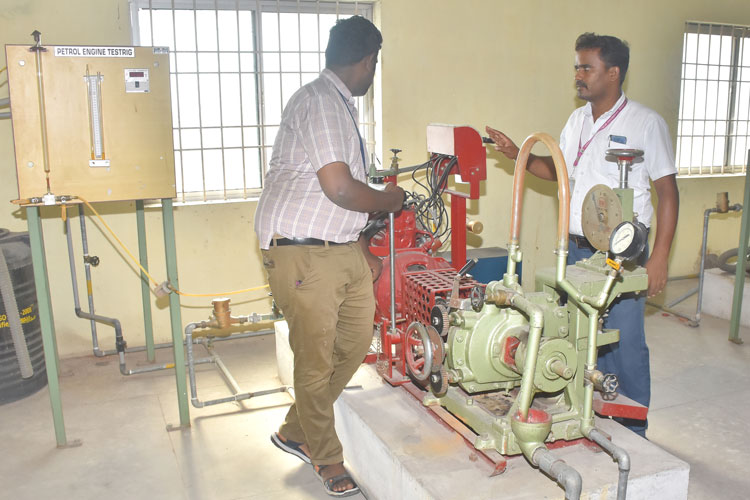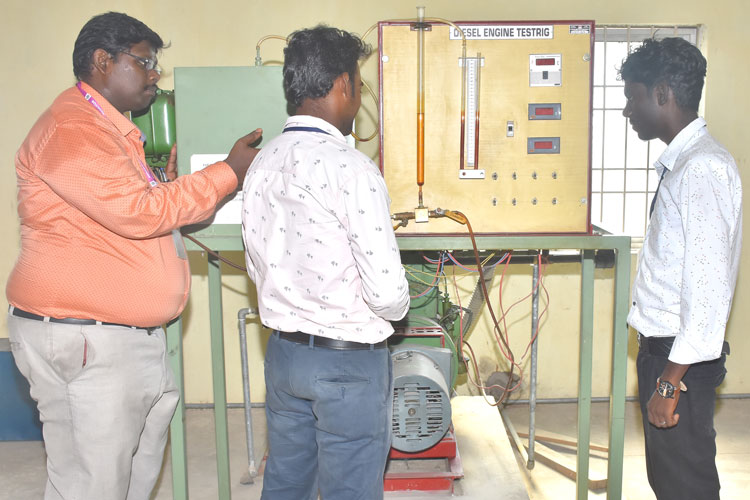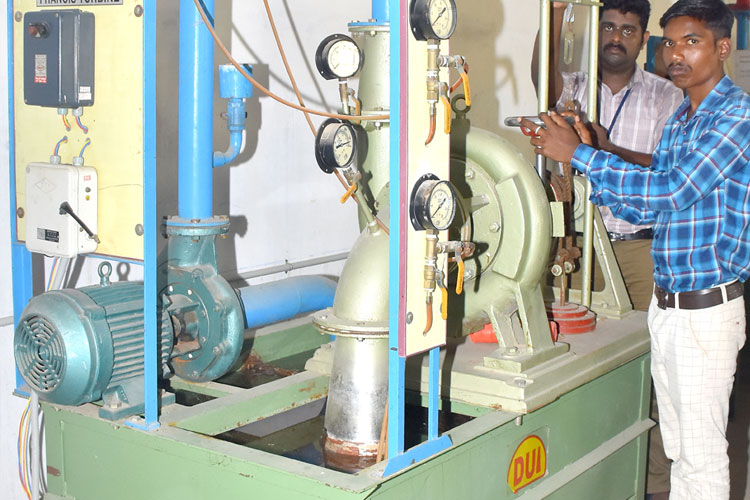- About the Department
- Vision and Mission
- HOD Profile
- Prog. Edu Objectives & Outcomes
- Laboratory
- Regulation & Syllabus
About the Department
Established in the year 2009, with 60 students, the Department of Mechanical Engineering has blossomed to 120 students in 2011 as a full- fledged state of the art facility, a centre of excellence for Quality Education. The Department boasts of highly qualified and experienced professionals with wide exposure in all aspects of the subjects they handle. Many faculties possess/ pursue PhD and are involved in research and consultancy projects including friction stir processing, welding, advanced machining, nano composite materials, alternate fuels, additives, cogeneration.
The students of the department have consistently performed well in academics with good marks and University ranks so far. In addition to academics, the students career is enhanced through training in soft skills, personality development and placement training classes. With industrial and field experts, value added programs such as CNC Machine Programming, CATIA, PIPING-SOFTWARE, CFD, SAP and GATE are regularly conducted.
Vision
The Department of Mechanical Engineering will be globally recognized as a pioneer in Under Graduate Engineering Programs through its excellence in teaching, catering to the significant and evolving societal needs.
Mission
- To serve the society by developing competent engineers with outstanding leadership qualities and ethical values.
- To address the progressive needs of the society and industry using modern engineering tools and cutting edge technologies.
- To inculcate the importance of professional development within budding engineers through sustained learning.
HOD Profile
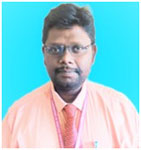
Prof. M. Jayaomprakash, M.Tech., (Ph.D)
Professor and Head of the Department of Mechanical Engineering
He has more than 16years of Teaching experience in the field of Mechanical Engineering. He believes in the accessibility of science and technology to all addressing the specific needs of the community. He has completed his B.E at St.Peter’s Engineering college, Chennai and M.Tech. From Dr.MGR University Chennai. He has received his Ph.D. from College of Engineering Guindy Campus, Anna University, one among the top ten technical universities in India.
Programme Educational Objectives(PEO)
- Graduates will contribute to the industrial and societal needs as per the recent developments using knowledge acquired through basic engineering education and training.
- Graduates will be able to demonstrate technical knowledge and skills in their career with systems perspective, analyze, design, develop, optimize, and implement complex mechanical systems.
- Graduates will be able to work in multidisciplinary environment developing complex mechanical systems.
- Graduates will work as a team or as an individual with utmost commitment towards the completion of assigned task using apt communication, technical and management skills.
- Graduate will recognize the importance of professional development by pursuing higher studies in various specializations.
Programme Outcomes (PO)
- Engineering knowledge:
Apply the knowledge of mathematics, science, engineering fundamentals, and an engineering specialization to the solution of complex engineering problems. - Problem Analysis:
Identify, formulate, review research literature, and analyze complex engineering problems reaching substantiated conclusions using first principles of mathematics, natural sciences, and engineering sciences. - Design/development of solutions:
Design solutions for complex engineering problems and design system components or processes that meet the specified needs with appropriate consideration for the public health and safety, and the cultural, societal, and environmental considerations. - Conduct investigations of complex problems:
Use research-based knowledge and research methods including design of experiments, analysis and interpretation of data, and synthesis of the information to provide valid conclusions. - Modern tool usage:
Create, select, and apply appropriate techniques, resources, and modern engineering and IT tools including prediction and modeling to complex engineering activities with an understanding of the limitations. - The engineer and society
Apply reasoning informed by the contextual knowledge to assess societal, health, safety, legal and cultural issues and the consequent responsibilities relevant to the professional engineering practice. - Environment and sustainability
Understand the impact of the professional engineering solutions in societal and environmental contexts, and demonstrate the knowledge of, and need for sustainable development. - Ethics
Apply ethical principles and commit to professional ethics and responsibilities and norms of the engineering practice. - Individual and Team work
Function effectively as an individual, and as a member or leader in diverse teams, and in multidisciplinary settings. - Communication
Communicate effectively on complex engineering activities with the engineering community and with society at large, such as, being able to comprehend and write effective reports and design documentation, make effective presentations, and give and receive clear instructions. - Project Management and Finance
Demonstrate knowledge and understanding of the engineering and management principles and apply these to one’s own work, as a member and leader in a team, to manage projects and in multidisciplinary environments. - Life long learning
Recognize the need for, and have the preparation and ability to engage in independent and life-long learning in the broadest context of technological change.
Programme Specific Outcomes (PSO)
- Fundamental Domain Knowledge: Design mechanical systems in various fields of machine elements, thermal, manufacturing, industrial and inter disciplinary fields using engineering/technological tools.
- Usage of software programs: Resolve new challenges in Mechanical Engineering using modern computer tools and software programs.
- Continual learning and Research : Develop intellectual and technical solution to complex mechanical problems through continual learning and research.
Laboratory
Mechanical Engineering department has a total of 1,700 square meter land area for laboratories. Research and Development (R&D) center in the institution provides a platform to the students of MECH to apply the learnt concepts in class to extend to do research in addition to laboratory experiments listed in the academic curriculum. There are separate labs for each of the Semester that includes
- Engineering Practices Laboratory
- Manufacturing Technology Laboratory – I
- Computer Aided Machine Drawing
- Manufacturing Technology Laboratory – II
- Strength of Materials and Fluid Mechanics and Machinery Laboratory
- Kinematics and Dynamics Laboratory
- Thermal Engineering Laboratory
- Metrology and Measurements Laboratory
- CAD / CAM Laboratory
- Design and Fabrication Project
- Simulation and Analysis Laboratory
- Mechatronics Laboratory
- Project Work
